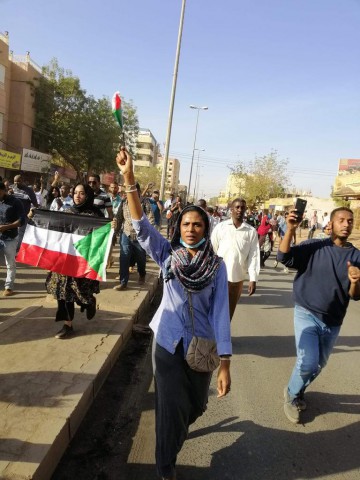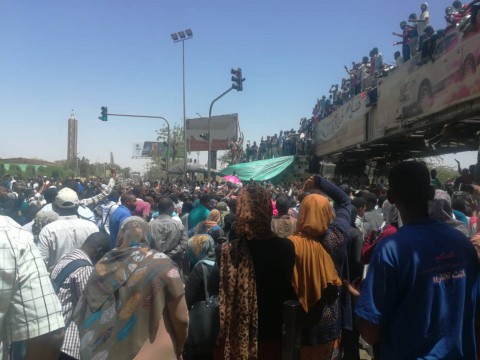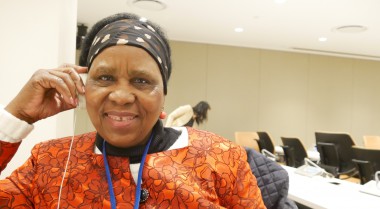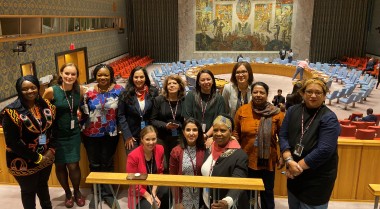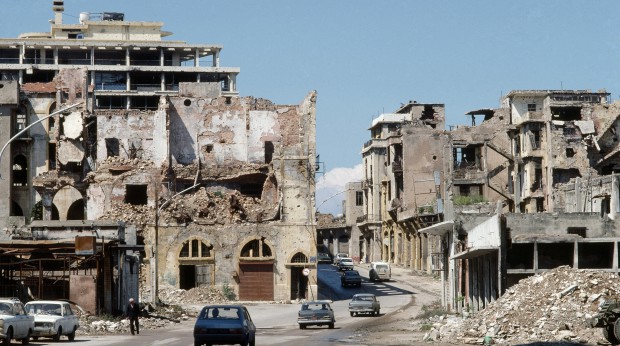
Marching towards inclusion in Sudan
Economic hardship and the rising cost of living has wreaked havoc in Sudan. In the name of a better quality of life, the people of Sudan have united and taken to the streets, to make their voices heard. Protests began in 2018, culminating in a power-sharing agreement between the military and an umbrella group called ‘Forces of Freedom and Change’, who represented the protesters of Sudan. For Suhair Mahdi Mohieldin Ahmed, the Executive Director of the Human Security Initiative Organisation (MAMAN) and GPPAC member, these events symbolised harmonious living and a vision of equality in the future. In 2019 the Council on Foreign Relations reported that the participation of civil society groups, including women’s organisations make peace agreements 64% less likely to fail. Statistics such as these make discussing the role of women in conflict more important than ever.
Fueling Outcry
The rising cost of goods, specifically bread and fuel initially sparked these protests. However, anger amongst the people of Sudan has been bubbling away for some time, edging closer to boiling point. The protests moved towards demanding the removal of President Al-Bashir, with demonstrators refusing to move from outside the military headquarters until they achieved their result. On 11th April 2019, the military announced the president had been forced to step down. However this did not end the events in Sudan. With women at the forefront of protests, demands were made for the military to transfer authority to the civilian administration. Bravery and unity prevailed, as the people of Sudan looked past the violence security forces used against them, reaching a power-sharing agreement on the 4th August. Represented by an umbrella group called Forces of Freedom and Change, negotiations have ended an all military rule of Sudan.
In 1989, Al-Bashir came to power during a coup in the civil war. With Bashir’s manifesto centring on the inability of Sudanese citizens to freely access bread and fuel, the 2018 protests were engulfed by a sense of irony and hypocrisy. But the protests stood for more than this. They developed into a symbol of unity and an opportunity for the community to step out in the name of a society that rejected the violation of rights and sought freedom, justice and peace.
The Education Gap
After witnessing the protests and the role of women in these events, Suhair shared her insight into the current situation in her country. She believes that during conflict, women are one of the most significantly affected segments of society.
“In Sudan, women feel the impact of the level of living, of war, of poverty; whilst being responsible for their children and family, providing for their basic needs and at any moment knowing that the government can stop their work.”
Within Sudanese society, the general level of education for women is low. Particularly in rural areas, women are more or less illiterate and have no awareness of their rights, leaving them vulnerable to mistreatment. Suhair recounts incidents of abuse such as women being beaten or arrested for wearing trousers in public. There are, however, some women who hold distinguished working roles, even in the government. Educated women could no longer remain silent. They wanted to increase women’s standard of living, access to opportunities, health care and rights. The protests acted as an opportunity to step out and raise awareness. To make a change.
Women were inspired to take to the streets, with the face of the protests becoming a lady referred to as ‘Kandaka’, meaning Nubian Queen. Whilst such significant participation in the protests marked a milestone for women, there is still a long way to go.
This act of leadership and bravery brings a vision of hope for the future; there must be fundamental changes in the lives of Sudanese women to protect their rights. For the first time, the Ministry of Foreign affairs is led by a woman. But their representation in permanent government and political parties must be increased. Suhair believes women are the most effective members of their communities: they are aware of the problems surrounding them and the needs of others through their maternal role and the dependence of others on them to provide for their families. Their position within the community would also make them vital contributors to peace negotiations.
The Way to Empowering Women’s Future
For these changes to be made, women need access to higher levels of education and to develop knowledge surrounding communication within certain governmental structures. Through Suhair’s work at MAMAN, she aims to empower and strengthen women and their roles within society. MAMAN provides women with training, focused on capacity building, teaching communication and advocacy skills and giving grants to start small businesses.
Suhair explained that they, “are putting together strategies to move forward towards empowering women and involving them in politics, but to do this, we need collaboration and coordination with governmental and civilian organisations too. Whilst this is not easy, it is possible”
Despite there still being barriers to overcome, the protests throughout the past year has created an atmosphere in which women can raise their voices. They have become an important part of Sudan’s vision for a better future. Even in the media, women have been stepping forward and expressing themselves. The events symbolised inclusivity, with people from all walks of life participating.
“Everyone came together, working in harmony and providing for each others’ needs. Homeless children were assisted in finding school classes to attend, sick people were helped to find medicine. Everyone was taking care of each other, regardless of their differences. It was a time for everyone and an insight into Sudan’s prosperous future.”
